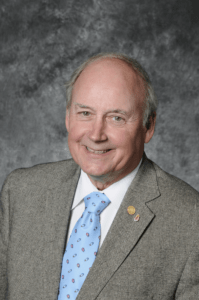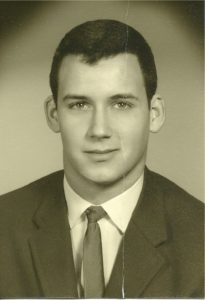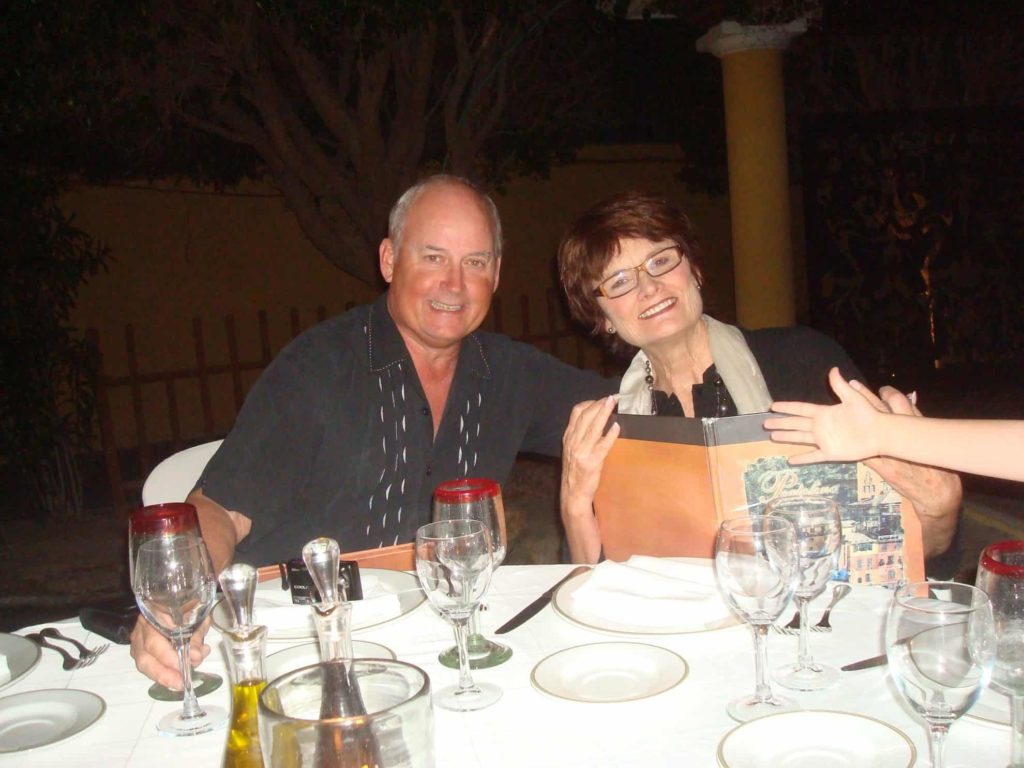Dr. Keith V. Krell: A Musician With 2020 Vision
By Elisabeth Lisican
 As a musician, incoming AAE President Keith V. Krell, D.D.S., M.S., M.A., knows a thing or two about harmony.
As a musician, incoming AAE President Keith V. Krell, D.D.S., M.S., M.A., knows a thing or two about harmony.
“As specialists we have been debating – not arguing — and discussing, many different issues over the course of time,” he said. “Even with all of the differences of opinion, we still have more similarities than differences. We are more like a community or family that can talk and maybe even bicker a little, but when it comes down to protecting the specialty, we are all capable of coming together and becoming unified as a specialty.”
As a true collaborator, Dr. Krell prefers to think of his upcoming presidency as a group effort – a band, if you will – rather than a solo act.
“The idea that it’s my presidency — I would dismiss that it’s mine alone,” he said.
“I might be the president, but I’m just standing on the shoulders, so to speak, of those who preceded me.”
Dr. Krell, who currently resides in West Des Moines, Iowa, originally hails from Houston.
He received his D.D.S. and M.S. degrees from the University of Iowa. As a Diplomate of the American Board of Endodontics, Dr. Krell has held several executive positions, including president of both the American Board of Endodontics and the Foundation for Endodontics. Dr. Krell also sits on the Foundation for Endodontics Board of Trustees. He retired from the U.S. Army National Guard as a lieutenant colonel in 1993 after 22 years of service.
Dr. Krell taught at the University of Iowa full time for eight years and was the graduate program director for three years before going into private practice. He maintained a private practice in West Des Moines, Iowa, for nearly 30 years before retiring at the end of 2017. He has served as an adjunct clinical professor of endodontics at the University of Iowa College of Dentistry for the past 30 years. Currently, he provides patient care at Broadlawns Medical Center in Des Moines on a quarterly basis.
“What solidified my interest in dentistry was after I graduated from Washington University in St. Louis, I was drafted and I enlisted in the Navy, becoming a Navy dental technician. My experience on the other side of the chair inspired me. I thought — this would be a great occupation to pursue.”
After studying pulp biology in dental school, he realized that it was the biology that interested him most — not just the drilling and filling.
“Preservation of the pulp was almost as important as being able to remove it,” he said. “And so it was the prevention side of dentistry that truly attracted to me the profession. My original impression of the ‘drill and fill’: you put in a filling and two years later you replace it, because it’s broken down. That didn’t have any appeal to me.”
“I’m a pulp lover, not a pulp hater,” he added, with a chuckle.

A younger Dr. Keith Krell
Something you might not know about Dr. Krell is he also has a background in sociology.
“My actual background from Washington University was in sociology. I also received a master’s in sociology from United States International University, San Diego, while serving in the Navy,” he said. “With a sociology degree you also learn social psychology. You are exposed to many leadership styles, the Myers-Briggs, and all the earlier studies such as Maslow’s Hierarchy of Needs. At any rate, I’ve been very fortunate with these past learning experiences, when thinking about leadership.
“Two examples of how my past study of sociology affected my present leadership style are reflected in my times with the American Board of Endodontics and then on the AAE Foundation Board.”
Dr. Krell reflected on those experiences.
“In 2001, Bill Schindler and I joined a very progressive group of directors of the ABE. We talked early on about how we would like to see changes in the ABE that could help streamline the process. In the six years Bill and I were on the ABE board, collectively, we (the board) changed the written test from paper to computer, which allowed applicants to take the test near their home and not have to come to Chicago in November. The sequences were changed from the written, case portfolio and then oral exam, to all of the current choices of going through the process. Residents were allowed to take the written prior to graduation and time requirements between exams were eliminated. We also brought down the case portfolio numbers over time. You just learn to cooperate with folks, and set a vision with your fellow compatriots, and you’re able to make real changes that can make a difference for the profession. I am glad to see the increase in new Diplomates today and know that it all started over 18 years ago!
“When I was president of the Foundation, I was following Dr. Eddy Skidmore, who’s a wonderful person to work with … We actually grew the corpus from $19 million to a little over $27 million in just six years. We had seven years in a row of a million-dollar-plus pledges. We began the endowed chairs matching program in 2007 and announced the first recipient, The University of Texas at Houston in 2009. In 2013, we budgeted $2.5 million for Regenerative Endodontic research to three research teams. In addition to all of that, we increased the support to full-time educators for meetings and travel. Looking back, I can say we initiated several very successful programs. Again, it was a great team of volunteers to work with!”
As for an AAE presidency theme? Well, “2020 Vision” has a nice ring to it.
“My meeting is in 2020 — vision for the future.”
Dr. Krell is setting his sights on the importance of evidence-based research. “In my 38 years of being an endodontist, I have seen the same advertising words used in different cycles of endodontics. The three words: faster, easier and more economic are the three things that seem to be emphasized from manufacturers advertised to dentists. That kind of wording has been used going back to hand files that were developed 40 years ago. As instrumentation features have advanced, with advertising it’s the same thing. It’s been interesting to watch how that has cycled.”
Dr. Krell is also dedicated to making sure the states do not eliminate the definition of a specialist. “We fought that little battle here in Iowa just a year ago. As we become challenged as specialists, I think we do need to insist that the state licensing boards recognize that a specialist is someone who has had advanced training over a prolonged period of time who has been evaluated in an appropriate setting and is justifiably someone with advanced training.”
Dr. Krell has been married to his wife Diane for 48 years. The couple have a son and daughter, and five grandchildren – some of whom are as musical as he is and some who have surpassed him!

Dr. Krell and his wife Diane
“Music is therapeutic for me (cheaper than a psychiatrist),” he said. “You can have a rough day and come home and … if you really need to blow off steam, it’s fun to just turn the amp up and crank out some sound and lose some hearing.”
When asked about his own musical influences, Dr. Krell – who learned guitar by ear and says he “wore out a lot of records trying to figure out how to emulate them” — has a long list.
“Back in the AM radio days, I was into the Everly Brothers, Elvis and The Ventures, when I first picked up the guitar,” he said. “Later, the Beatles, Rolling Stones, Beach Boys — those are the groups that we would try to copy. In college, Clapton, Jeff Beck, Yardbirds, and all of the English invasion. And then I got into Motown, which took me down the path with blues. Folks that I got exposed to were all the Kings: BB, Albert, Freddie — they were idols and still are …”
Thus, inquiring minds want to know – will we get to see Dr. Krell perform live during his presidency?
With AAE2020 being set in Nashville, that’s pretty much a guarantee.
“I’ve got my ‘Root Canal Away Your Pain’ song,” he said. “There will probably be at least one more song that is developed. Dr. [Alan S.] Law has helped me to come up with some new lyrics.
“We’re going to try and bring the house down.”
Elisabeth Lisican is an integrated communications specialist with the AAE. She can be reached at elisican@aae.org.




